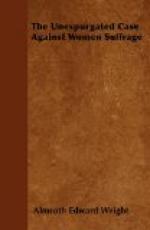With regard to the suffragist’s legislative sagacity we may note that she asks that we should put back the clock, and return to the days when any arbitrary principle might be adduced as a ground for legislation. It is as if Bentham had never taught:—
“What is it to offer a good reason with respect to a law? It is to allege the good or evil which the law tends to produce; so much good, so many arguments in its favour; so much evil, so many arguments against it.
“What is it to offer a false reason? It is the alleging for, or against a law, something else than its good or evil effects.”
Next, we may take up the question as to whether an unwelcome generalisation may legitimately be got out of the way by characterising it as a prejudice. This is a fundamentally important question not only in connexion with such an issue as woman suffrage, but in connexion with all search for truth in those regions where crucial scientific experiments cannot be instituted.
In the whole of this region of thought we have to guide ourselves by generalisations.
Now every generalisation is in a sense a prejudgment. We make inferences from cases or individuals that have already presented themselves to such cases or individuals of the same class as may afterwards present themselves. And if our generalisation happens to be an unfavourable one, we shall of necessity have prejudged the case against those who are exceptions to their class.
Thus, for example, the proposition that woman is incapable of usefully exercising the parliamentary franchise prejudges the case against a certain number of capable women. It would none the less be absolutely anarchical to propose to abandon the system of guiding ourselves by prejudgments; and unfavourable prejudgments or prejudices are logically as well justified, and are obviously as indispensable to us as favourable prejudgments.
The suffragist who proposes to dispose of generalisations which are unfavourable to woman as prejudices ought therefore to be told to stand down.
It has probably never suggested itself to her that, if there were a mind which was not stored with both favourable prejudgments and prejudices, it would be a mind which had learned absolutely nothing from experience.
But I hear the reader interpose, “Is there not a grave danger that generalisations may be erroneous?”
And I can hear the woman suffragist interject, “Is there not a grave danger that unflattering generalisations about woman may be erroneous?”
The answer to the general question is that there is of course always the risk that our generalisations may be erroneous. But when a generalisation finds wide acceptance among the thoughtful, we have come as close to truth as it is possible for humanity to come.
To the question put by the suffragist the reply is that experience with regard to the capacity of woman has been accumulating in all climes, and through all times; and that the belief of men in the inherent inferiority of women in the matter of intellectual morality, and in the power of adjudication, has never varied.




